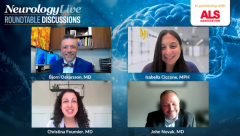
Clinicians Express Growing Optimism in ALS Research and Treatment Advancements
Experts in ALS care and research shared their optimism about emerging treatments, aiming to deepen scientific understanding, and the potential role of advocacy in accelerating progress. [WATCH TIME: 4 minutes]
WATCH TIME: 4 minutes
Episodes in this series

Recent advancements in amyotrophic lateral sclerosis (ALS) research may reshape how clinicians understand and help patients manage the disease, with potential therapies slowly emerging that aim to target both genetic and cellular pathways. Alongside these strides, there seems to be a growing emphasis on a holistic care approach following diagnosis to offer additional support for patients throughout the disease course. Furthermore, genetic testing could become more valuable in guiding diagnosis and offering refined treatment decisions for patients. Together, these developments in the field might highlight a shift toward more comprehensive, individualized care strategies that can address both the biological and lived experience of patients with ALS.
In collaboration with
In this final episode, ALS experts discussed key developments that could shape the future of care and treatment. They highlighted progress in understanding the molecular underpinnings of the neuromuscular disease and the emergence of targeted therapies on the horizon. Although acknowledging that change may seem slow from a patient’s perspective, the speakers emphasized the momentum behind research, the increasing interest in the field, and the critical impact of patient advocacy in driving innovation. The panel expressed confidence that more effective treatments are within reach and underscored the importance of continued scientific and community collaboration.
Transcript edited for clarity.
Isabella Ciccone, MPH: What are you looking forward to that is upcoming in the field? I know there was mention of AI and gene therapies. Is there anything else that you are excited about and willing to share with our audience?
Christina Fournier, MD: I think one thing that's important to convey is that I know from the patient side, sometimes it seems like not a lot has changed in the past decade or two. I think behind the scenes, when we see in the lab how much we're learning about the mechanisms of ALS and specific targets that could be drugged and things like that, we’ve really learned a lot in recent years. I think that we are getting closer and closer to having more meaningful treatment.
So it can feel like that’s not happening if you don't have an eye into the science, but I am excited that we're going to have meaningful treatments over the course of my career for this. So that’s exciting to me, and I think brings hope and something we should do a better job, I think, of talking about so that people know there really is progress being made, even if it's not a drug I can prescribe today. I think that we're getting there.
Bjorn Oskarsson, MD: Looping back to what we said in the beginning, that we do have. I mean, when I went into ALS in about 2000, my dream was to be able to treat somebody effectively, and I can do that now. Again, not in any way everybody—it's still just a few—but there are patients who I can treat effectively. That's the dream.
Now we need to get it to everyone. We are approaching that. So again, there are a lot of these fundamental understandings of ALS that we have achieved. We still think of ALS largely as this kind of TDP-43 proteinopathy, and the first really targeted treatments for that are going to be coming now. We’ll see if they are working as well as we hope, that would be game-changing. I think it's too early to know if it will materialize, but there's definitely hope, and that's not that far in the future.
John Novak, MD: I think the interest in it has just grown exponentially. We used to go to conferences, and you knew everybody that was sitting next to you, because it was just such a small group. Now we're overflowing at some of our research conferences, which is great, because there's a lot of interest in it.
There are a lot of people targeting different things. Like Dr. Fournier said, there's so much going on that we don't even know about, that’s out there, that's happening. It's just going to take a little bit of luck and more knowledge, and I think we'll be there sooner than you know. I feel so much more confident about it than I used to be.
Christina Fournier, MD: The ALS advocacy community is really motivated and powerful, and people are really motivated to participate in research and contribute to science. I think we have this really powerful team of people with ALS and their allies that fight for this. It really, I think, makes a difference in how science is able to progress. We're very lucky to have the people with ALS that we work with just tirelessly fighting for progress.
John Novak, MD: When there's not a lot of you, you’ve got to be loud. And I think some of them really are, and they’re getting heard. That’s great.
Newsletter
Keep your finger on the pulse of neurology—subscribe to NeurologyLive for expert interviews, new data, and breakthrough treatment updates.











